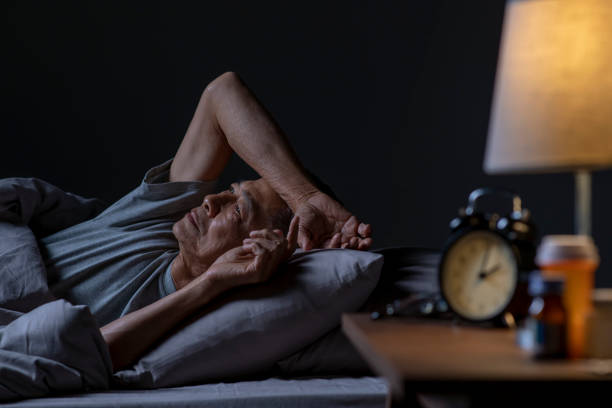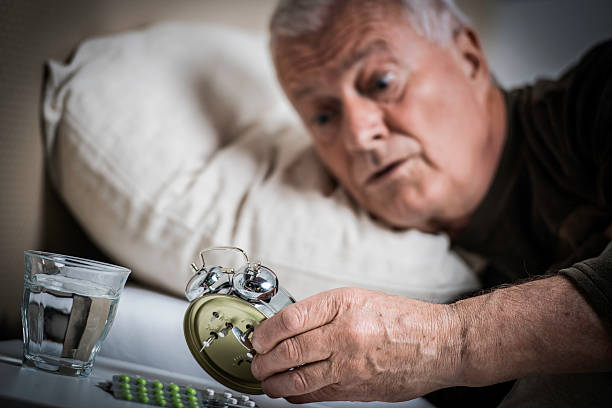Introduction

Living with Parkinson's disease can be challenging, and it is important to establish healthy habits for dealing with symptoms like difficulty sleeping. Developing and maintaining healthy sleep habits is essential in managing the sleep issues related to Parkinson's disease, allowing you to maximize the quality of your sleep and improve overall health.
This blog post will discuss tips for developing healthy sleep habits to help manage Parkinson's disease-related sleep issues. We hope you can use this information to improve your quality of life and find a better balance in managing your symptoms.
A brief overview of Parkinson's disease and its impact on sleep
Parkinson's disease (PD) is a long-term progressive neurological disorder that affects movements, coordination, and balance. It is caused by the degeneration of nerve cells in the brain leading to a decrease in dopamine production.
Major impacts
Here are some of the common impacts PD can have on sleep:
1. Difficulty initiating and maintaining sleep (DIMS).
2. Sleep fragmentation, difficulty getting into a deep sleep, or frequent awakenings throughout the night.
3. Excessive daytime sleepiness or fatigue due to lack of quality restorative sleep.
4. Increased risk of sleep-related disorders such as sleep apnea, REM Behavior Disorder (RBD), and periodic limb movement disorder.
5. Increased risk of depression or anxiety, which can further affect sleep quality.
Understanding Parkinson's Disease-Related Sleep Issues
Parkinson's disease can lead to various sleep-related issues, such as excessive daytime sleepiness and disrupted nighttime sleep. The changes in your body due to Parkinson's can affect how you feel during the day and at night, making it difficult to get a good night's rest. This can impact your quality of life and make it hard to manage other symptoms of Parkinson's disease.
To help you manage the sleep issues associated with Parkinson's, it is important to understand how they can affect your daily routine. Here are some common sleep-related issues associated with Parkinson's:
• Excessive Daytime Sleepiness: People with Parkinson's often experience excessive daytime sleepiness, making it difficult to stay focused and alert during the day.
• Restless Legs Syndrome (RLS): RLS is a neurological disorder that causes an uncomfortable sensation in your legs, making it hard to relax or fall asleep.
• Sleep Apnea: Sleep apnea is a condition where you experience pauses in breathing while you sleep, leading to daytime drowsiness.
• Insomnia: People with Parkinson's often have difficulty falling asleep or staying asleep throughout the night, leading to insomnia.
Importance of Healthy Sleep Habits for Parkinson's Disease Management
As part of managing Parkinson's disease, it is essential to encourage healthy sleep habits. Poor sleep can worsen the symptoms associated with Parkinson's and hinder medication effectiveness. Below are some tips on how to develop healthy sleep habits:
• Establish a regular bedtime routine that includes preparing for bed an hour before your desired sleep time.
• Avoid stimulating activities such as watching TV or using a computer, phone, or tablet before bedtime.
• Exercise regularly throughout the day to help manage fatigue associated with Parkinson's disease.
• Try relaxation techniques like deep breathing and guided imagery before you settle into bed each night.
• If possible, avoid taking naps during the day.
• Avoid large meals and caffeine late in the day.
• Create a comfortable sleep environment with dim lights, quiet sounds, and mobility enhancing friction-reducing sheets and sleep garments.
Tips for Developing Healthy Sleep Habits
1. Establish a regular sleep schedule:
Go to bed and wake up simultaneously every day, even on weekends or days off. This will help your body develop a consistent sleep-wake cycle and make falling and staying asleep easier.
2. Make sure your bedroom is comfortable:
Keep your bedroom at a comfortable temperature, and make sure it's dark and quiet. Eliminate any distractions like TVs, computers, or phones.
3. Exercise regularly:

Regular physical activity can reduce stress and improve the quality of your sleep. Aim to get 30 minutes of moderate physical activity daily, but avoid strenuous exercise close to bedtime.
4. Avoid stimulants close to bedtime:
Caffeine and nicotine can interfere with sleep, so avoid consuming them too late. Alcohol consumption should also be minimal since it can disrupt your sleep patterns.
5. Avoid taking naps during the day:
While a short nap can help you feel refreshed, avoid naps during the day if you're having trouble sleeping at night.
6. Relax before bedtime:
Try to create a relaxing atmosphere in your bedroom an hour or two before bedtime. Read a book, listen to calming music, do some light stretching, or practice deep breathing exercises to help your body and mind relax.
7. Avoid clock-watching:

Constantly checking the time when you're trying to fall asleep will only increase stress levels and make it harder for you to get to sleep. If needed, turn the clock around so you can't see it.
FAQ's
How can I improve my sleep quality with Parkinson's?
It is important to develop healthy sleep habits to manage symptoms associated with Parkinson's disease. Establish a regular bedtime routine and ensure your bedroom is comfortable for sleeping. Exercise regularly throughout the day, avoid stimulating activities before bedtime, and try relaxation techniques such as deep breathing or guided imagery.
Why can't people with Parkinson's sleep at night?
People with Parkinson's may experience sleep disruption due to the disease. Symptoms like limb stiffness, tremor, and dyskinesia can interfere with a good night's rest. Additionally, Parkinson's can cause pauses in your breathing patterns during sleep, which can lead to daytime fatigue.
How do Parkinson's patients sleep?
The way people with Parkinson's sleep can vary depending on their symptoms. Some may experience difficulties falling or staying asleep, while others may have periods of deep and peaceful slumber alternating with early morning awakenings. Speaking to a doctor to find out which sleep pattern is best for you is important.
Why do people with Parkinson's sleep so much?
Excessive sleepiness during the day can be a symptom of Parkinson's disease. This excessive daytime sleepiness may be caused by poor quality night-time sleep, fatigue due to motor symptoms like tremors and dyskinesia, or medication side effects. Talking to your doctor if you are experiencing excessive sleepiness is important. They may recommend lifestyle changes, medications, or other treatments to help manage your symptoms.
What sleep meds help Parkinson's?
Your doctor may prescribe medications to help manage sleep-related symptoms of Parkinson's disease. Medications like melatonin, sedatives, and anti-depressants can help people with Parkinson's fall asleep and stay asleep throughout the night. Speaking to your doctor before taking any sleep medications is important as they may have side effects or interact with other medications.
How can I slow down Parkinson's symptoms?
While there is no known cure for Parkinson's disease, treatment options are available to alleviate symptoms and delay the progression of the disease. Treatments like medications, physical therapy, and lifestyle changes can help reduce symptoms and improve quality of life. Speak to your doctor to determine which treatment plan is best for you.
Conclusion
I hope this article has provided helpful tips and information on developing healthy sleep habits to manage Parkinson's disease-related sleep issues. If you are having difficulty sleeping, it is important to speak to a doctor as soon as possible to discuss treatments and other options available. With the right support and lifestyle changes, you can improve your overall quality.

